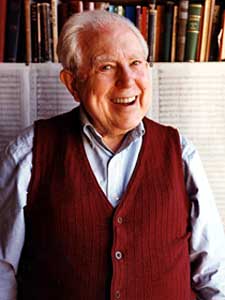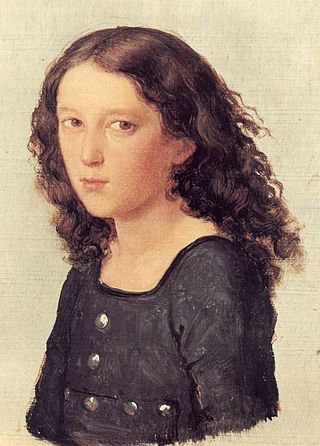Related Research Articles

Emmanuel Pahud is a Franco-Swiss flautist.

Elliott Cook Carter Jr. was an American modernist composer. One of the most respected composers of the second half of the 20th century, he combined elements of European modernism and American "ultra-modernism" into a distinctive style with a personal harmonic and rhythmic language, after an early neoclassical phase. His compositions are performed throughout the world, and include orchestral, chamber music, solo instrumental, and vocal works. The recipient of many awards, Carter was twice awarded the Pulitzer Prize for his string quartets; he also wrote the large-scale orchestral triptych Symphonia: sum fluxae pretium spei.

Stuart Oliver Knussen was a British composer of contemporary classical music and conductor. Among the most influential British composers of his generation, his relatively few compositions are "rooted in 20th-century modernism, [but] beholden to no school but his own"
Derek Bermel is an American composer, clarinetist and conductor whose music blends various facets of world music, funk and jazz with largely classical performing forces and musical vocabulary. He is the recipient of various awards including a Guggenheim Fellowship and the American Academy in Rome's Rome Prize awarded to artists for a year-long residency in Rome.

The Concerto for Flute, Harp, and Orchestra in C major, K. 299/297c, is a concerto by Wolfgang Amadeus Mozart for flute, harp, and orchestra. It is one of only two true double concertos that he wrote, as well as the only piece of music by Mozart for the harp. The piece is one of the most popular such concertos in the repertoire, as well as often being found on recordings dedicated to either one of its featured instruments.

Ransom Wilson is an American flutist, conductor, and educator.
The Violin Concerto is a concerto for violin and orchestra in two movements by the American composer Christopher Rouse. The work was commissioned for violinist Cho-Liang Lin by the Aspen Music Festival and School and funded in part by a grant from the National Endowment for the Arts. It was completed August 18, 1991 and is dedicated to Cho-Liang Lin.

The Concerto for Piano, Violin, and Strings in D minor, MWV O4, also known as the Double Concerto in D minor, was written in 1823 by Felix Mendelssohn when he was 14 years old. This piece is Mendelssohn's fourth work for a solo instrument with orchestral accompaniment, preceded by a Largo and Allegro in D minor for Piano and Strings MWV O1, the Piano Concerto in A Minor MWV O2, and the Violin Concerto in D minor MWV O3. Mendelssohn composed the work to be performed for a private concert on May 25, 1823 at the Mendelssohn home in Berlin with his violin teacher and friend, Eduard Rietz. Following this private performance, Mendelssohn revised the scoring, adding winds and timpani and is possibly the first work in which Mendelssohn used winds and timpani in a large work. A public performance was given on July 3, 1823 at the Berlin Schauspielhaus. Like the A minor piano concerto (1822), it remained unpublished during Mendelssohn's lifetime and it wasn't until 1999 when a critical edition of the piece was available.
The Concerto for Clarinet is a composition for solo clarinet and orchestra by the American composer Joan Tower. The work was commissioned by the Walter W. Naumburg Foundation for the clarinetist Charles Neidich, to whom the piece is dedicated.
Notes on Light is a cello concerto by the Finnish composer Kaija Saariaho. The work was commissioned by the Boston Symphony Orchestra and was first performed at Symphony Hall, Boston on February 22, 2007, by the cellist Anssi Karttunen and the Boston Symphony Orchestra under the conductor Jukka-Pekka Saraste.
Dialogues is a composition for solo piano and chamber orchestra by the American composer Elliott Carter. The work was commissioned by the BBC for the pianist Nicolas Hodges and completed in 2003. It was first performed on January 23, 2004 at the Queen Elizabeth Hall in Southbank Centre, London, by Nicolas Hodges and the London Sinfonietta under the conductor Oliver Knussen. The piece was a finalist for the 2005 Pulitzer Prize for Music. In 2012, Carter composed a followup to the piece Dialogues II for the conductor Daniel Barenboim's 70th birthday.
The Concerto for Horn and Orchestra is a horn concerto by the American composer Elliott Carter. The work was commissioned by the Boston Symphony Orchestra for the horn player James Sommerville. It was first performed on November 15, 2007 in Boston by Sommerville and the Boston Symphony Orchestra under the conductor James Levine.
Soundings is an orchestral composition by the American composer Elliott Carter. The work was commissioned by the Chicago Symphony Orchestra for their final season with the conductor Daniel Barenboim as music director. It was first performed on October 6, 2005 at the Symphony Center, Chicago, by Barenboim and the Chicago Symphony Orchestra.
The Concerto for Piano is a composition for solo piano and orchestra by the American composer Elliott Carter. The work was commissioned by the pianist Jacob Lateiner with support from the Ford Foundation. It was composed between 1964 and 1965 and was first performed at Symphony Hall, Boston on January 6, 1967, by Lateiner and the Boston Symphony Orchestra under the conductor Erich Leinsdorf. The piece was dedicated to the composer Igor Stravinsky for his 85th birthday.
The Asko Concerto is a concerto for chamber orchestra by the American composer Elliott Carter. The work was commissioned by the Dutch chamber group Asko|Schönberg, for which the piece is titled. It was composed in January 2000 and was first performed in Concertgebouw, Amsterdam on April 26, 2000, by the Asko ensemble under the conductor Oliver Knussen. The piece is dedicated to Asko|Schönberg.
The Double Concerto for Harpsichord and Piano with Two Chamber Orchestras is a composition by the American composer Elliott Carter. The work was commissioned by the Fromm Music Foundation and is dedicated to the philanthropist Paul Fromm. It was completed in August 1961 and was first performed at the Metropolitan Museum of Art's Grace Rainey Rogers Auditorium on September 6, 1961. The premiere was performed by the harpsichordist Ralph Kirkpatrick and the pianist Charles Rosen under the conductor Gustav Meier.
Interventions is a composition for solo piano and orchestra by the American composer Elliott Carter. The work was composed at the behest of the pianist Daniel Barenboim and the conductor James Levine to celebrate Carter's 100th birthday. The piece was completed on April 16, 2007 and was first performed in Symphony Hall, Boston on December 4, 2008 by Daniel Barenboim and the Boston Symphony Orchestra under James Levine.
The Double Concerto for Violin and Cello is a double concerto for violin, cello, and orchestra by the American composer John Harbison. The work was commissioned by the Friends of Dresden Music Foundation for the Boston Symphony Orchestra under the conductor James Levine. It was given its world premiere on April 8, 2010, by the spousal team of the violinist Mira Wang and the cellist Jan Vogler and the Boston Symphony Orchestra under the direction of Carlos Kalmar. The piece was composed in honor of the violinist Roman Totenberg.
Kraft is a composition for solo ensemble, electronics, and orchestra by the Finnish composer Magnus Lindberg. The work was commissioned by the Helsinki Festival and was first performed on September 4, 1985 by the Toimii ensemble and the Finnish Radio Symphony Orchestra under the direction of Esa-Pekka Salonen. The piece was awarded the International Rostrum of Composers in 1986 and won the Nordic Council Music Prize in 1988.
The Concerto for Piano and Orchestra is a piano concerto by the British composer Thomas Adès. The work was commissioned by the Boston Symphony Orchestra for the pianist Kirill Gerstein and was completed in 2018. It was first performed by Gerstein and the Boston Symphony Orchestra conducted by the composer at Symphony Hall, Boston, on 7 March 2019. The piece is Adès's second piano concerto following In Seven Days in 2008.
References
- 1 2 3 Carter, Elliott (2008). "Flute Concerto". Boosey & Hawkes . Retrieved January 30, 2016.
- ↑ Eichler, Jeremy (February 5, 2010). "BSO unveils Carter's Flute Concerto". The Boston Globe . Retrieved January 30, 2016.
- ↑ Tommasini, Anthony (September 30, 2011). "Very Late in His Career, a Composer Tries a Flute". The New York Times . Retrieved January 30, 2016.
- ↑ Hirsch, Lisa (December 7, 2011). "Boston's Ravishing Bay Area Bow". San Francisco Classical Voice. Retrieved April 30, 2016.